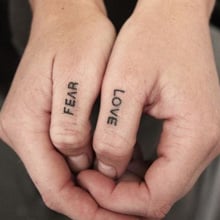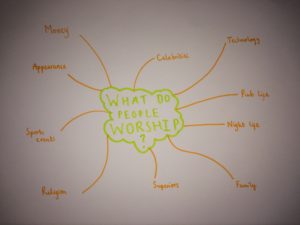As I have been generating ideas for my personal study surrounding the idea of relationships within my own life and my own family, I have also generated a few ideas which I believe I could draw into the study at some point to accompany other main ideas.
Although not familiar with the phobia as no one I know has this particular phobia, I believe it to be a very interesting concept which may work quite well as an underpinning theme throughout my project; I have started to research into the phobias of love and lonesomeness and I feel may be able to express these a ceratin way through my own interpretation of them – as this is only what I can do as I don’t know anyone with the fears but believe their relation to my main theme of ‘relationships’ could go hand-in-hand quite well as the two phobias are often scientifically linked with one another also. Although, I don’t have to directly or explicitly make it obvious or known that I am addressing the phobia in my own interpretation of it, it can be a concept that the audience eventuality realise as they progress through the book – or a concept that may be evident to certain people depending on the way they read visual prompts or it may only be noticeable to myself, however, would like to, in some way, represent what I believe a fear of love/loneliness may look like.
However, if I was going to show these phobias in some way in my project, I would have to be careful not offend anyone who may have it but would address it very carefully and very subtly to contrast the idea of cohesion and unity between the people you love – I first came up with the idea after realising the divorce of my parents would make an interesting starting point for a story about love and relationship. Love is such a strong concept that can unify people in ways which we like to think cant be broken but eventually, may become broken – in the process of breaking the people involved in the relationship whether it be romantically or emotionally with a relative. My efforts to re-build a relationship which feels like it has been somewhat lost with my dad also links to this idea.
(Words from fearof.net) The fear of love (or falling in love) phobia is known as Philophobia. The word originates from Greek “filos” which means ‘loving or beloved’. Individuals who suffer from this phobia fear romantic love or forming emotional attachments of any sort. Often this phobia is known to have cultural or religious roots, where the person may have been committed to an arranged marriage and hence fears falling in love.

This phobia is more common in women than in men. The condition can greatly affect one’s life to an extent that it becomes difficult to commit or form healthy relationships. Such people tend to live their lives in solitude.
Philophobia is an unwarranted and an irrational fear of falling in love. Sometimes, the sufferer does fall in love but it causes an intense emotional turmoil in his/her mind. There are many theories why this could happen. Therefore, there is a possibility of falling in love when you are a sufferer of this fear but it may still remain in your mind – the idea that you fear to form any sort of emotional connection with a partner and this may hinder your relationship as a result.
Symptoms may include:
Some people are so afraid of love that they cannot open up to anyone. They do have committed relationships, but cannot maintain any of them.
Their well being often depends on the responses they receive from the person they love. This can keep them high strung and anxious all the time. They may be extremely possessive or, conversely, they may drive away their loved ones with their detachment.
One also experiences severe anxiety owing to the pressures of commitment: restlessness, shallow breathing, rapid heart rate, nausea, chest pains etc are a few physical symptoms that can be attributed to Philophobia.
Panic and anxiety attacks are also common. These can be terrible since the sufferer often feels dizzy, or feels like running away, crying, shaking or sweating profusely or even feels as if s/he is fainting.
Autophobia, also called monophobia, isolophobia, or eremophobia, is the specific phobia of isolation; a morbid fear of being egotistical, or a dread of being alone or isolated. Sufferers need not be physically alone, but just to believe that they are being ignored or unloved.

Autophobia can be associated with or accompanied by several other phobias such as agoraphobia. This means people might be afraid of going out in public, being caught in a crowd, being alone, or being stranded.
Persons suffering from autophobia are unable to do many simple tasks that most can do easily. The fear of being alone also leads to bad relationships as the individual prefers abuse to being left alone – the area in which I believe I can link relationships with these two fears.
Physical symptoms:
Feeling unsteady, experiencing lightheadedness or dizziness
Feeling of choking
Rapid heart rate, palpitations or pounding heart
Sweating
Chest pain and discomfort
Nausea or gastrointestinal distress
Trembling or shaking
Numbness or tingling sensations
As this seems to be a more severe phobia in which sufferers may become suicidal or may begin to self-abuse themselves, OI feel like this may not be as very suitable concept to follow through with and may focus mainly on ‘Philophobia’ as I feel like I could represent this in a more interesting and abstract manner by using my knowledge of love and its power and then transferring this to a direct oppostite.

